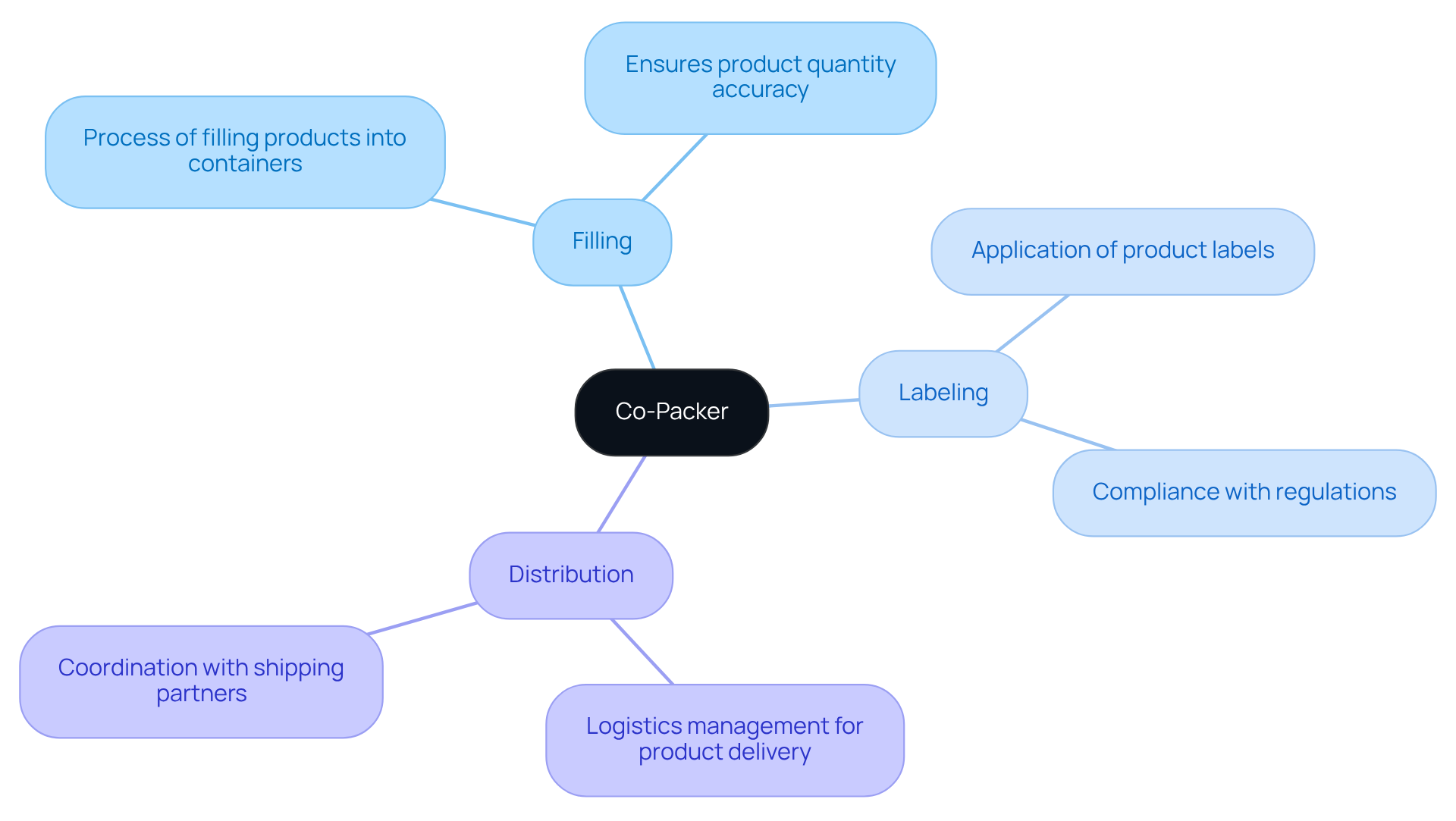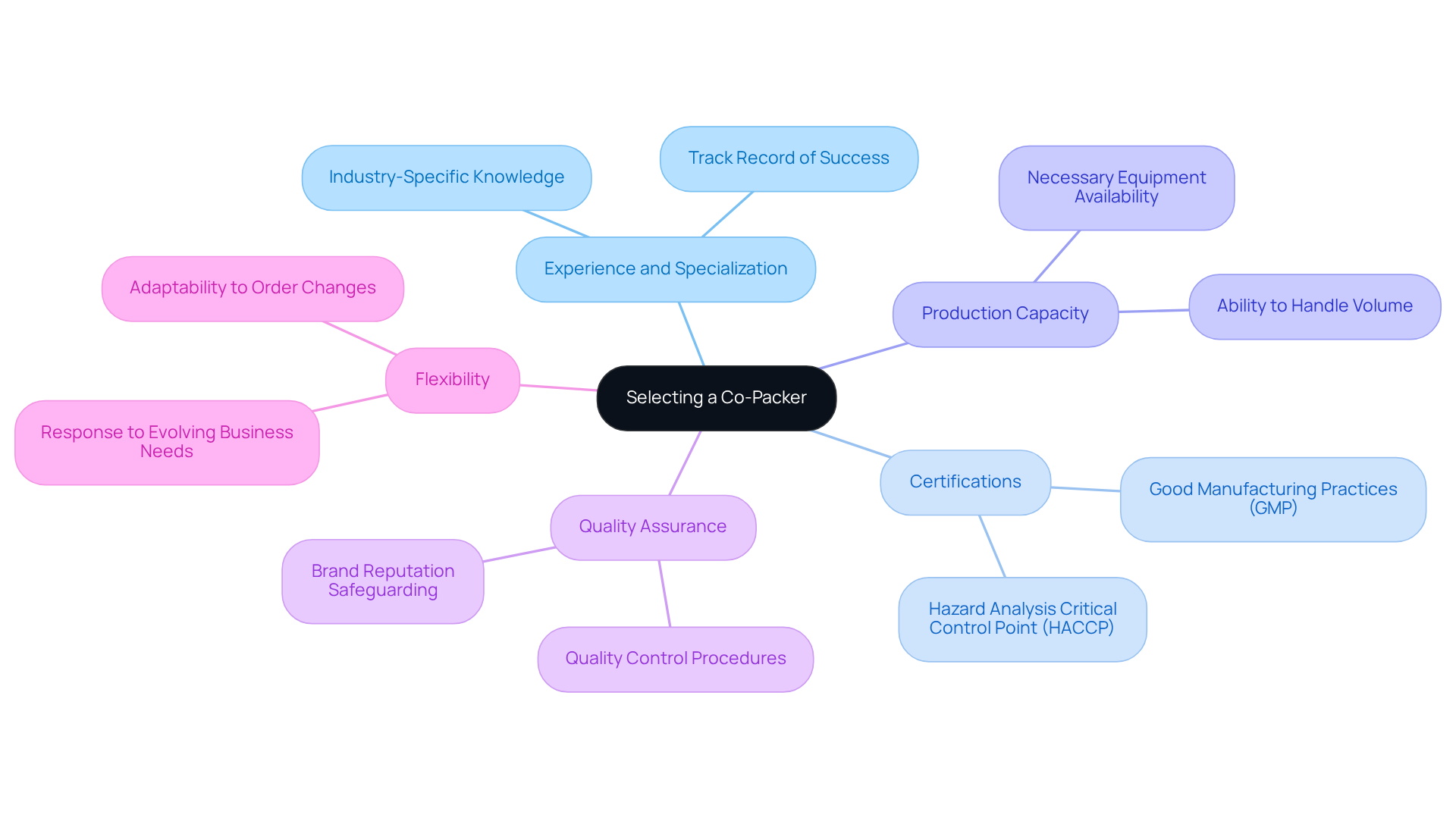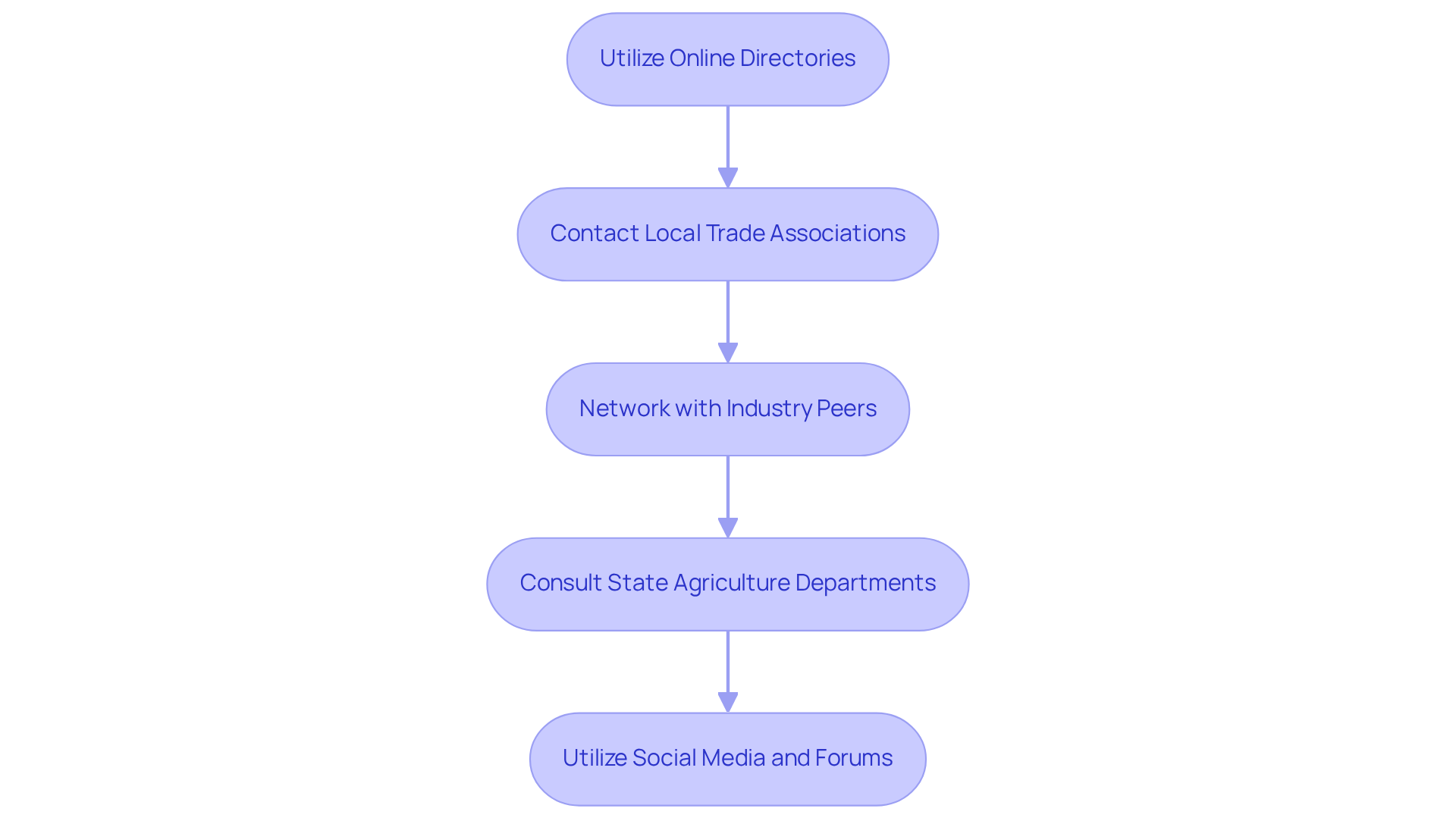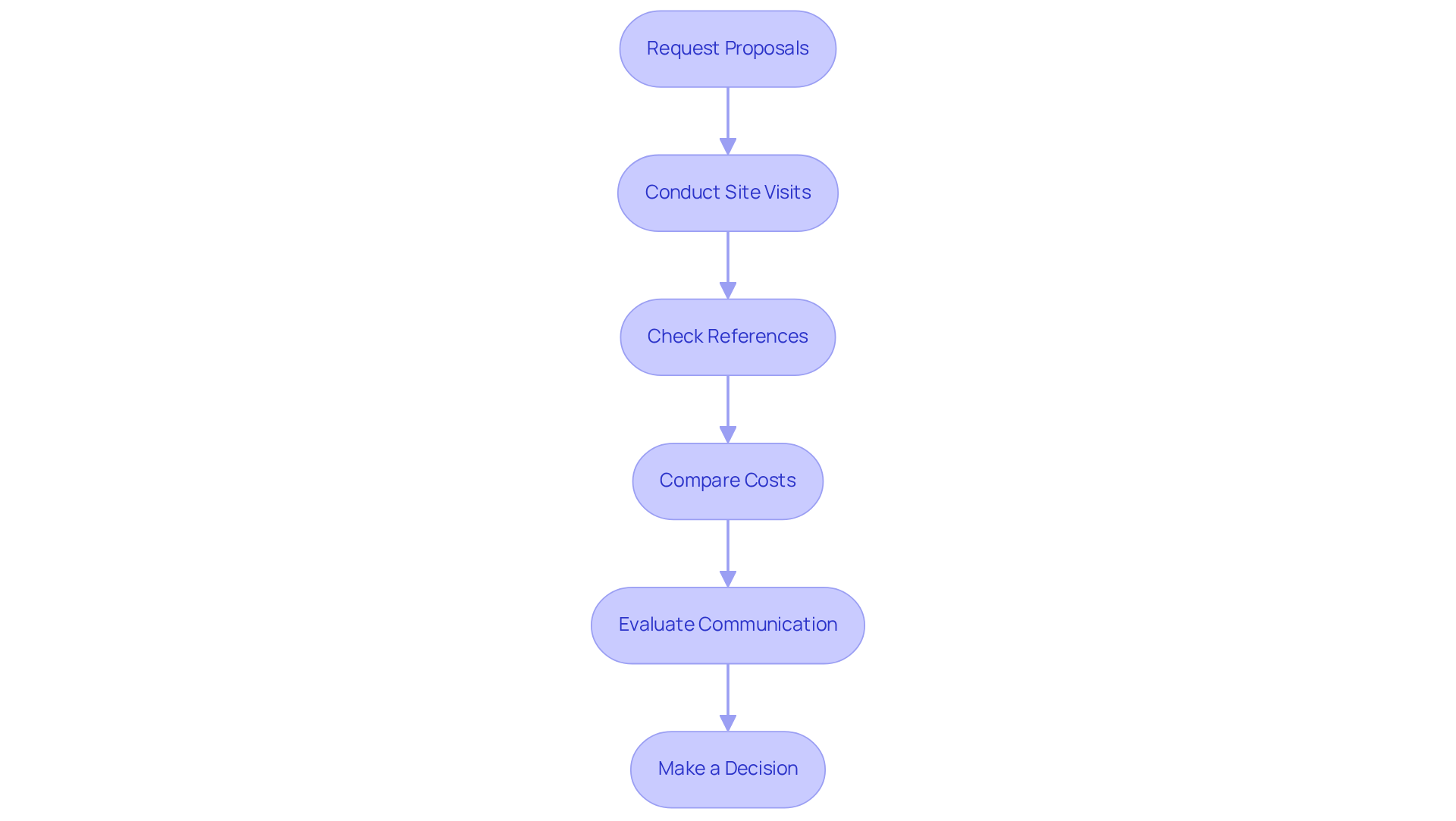Overview
To secure a reliable co-packer in your vicinity, adopt a structured approach that encompasses the identification of key selection criteria, conducting a thorough local search, and effectively evaluating potential candidates. This article delineates essential steps, including:
- The utilization of online directories
- Engaging in industry networking
- Meticulously comparing proposals and references
Collectively, these strategies ensure that you select a co-packer who not only aligns with your business needs but also upholds exemplary standards of quality and service.
Introduction
Finding the right co-packer can be a transformative decision for businesses aiming to optimize their packaging processes. As demand for efficient production and distribution rises, it becomes crucial to understand the methods for identifying and selecting a dependable co-packer.
What challenges may emerge in the expansive landscape of co-packers? How can businesses ensure they partner with a provider that aligns seamlessly with their specific needs and objectives? By addressing these questions, companies can navigate the complexities of co-packing and secure a partner that fosters their success.
Understand What a Co-Packer Is
A co-packer, or contract packager, is a specialized firm dedicated to packaging goods for other companies. These firms manage a range of essential tasks, including:
- Filling
- Labeling
- Distribution
Co-packers near me are particularly advantageous for companies that may lack the necessary facilities or resources to package their products in-house. By outsourcing this crucial function, businesses can focus on their core strengths while ensuring that their products are packaged efficiently and professionally. Understanding the role of a is essential for evaluating whether this service aligns with your business needs and objectives.

Identify Key Criteria for Selecting a Co-Packer
When selecting a co-packer, it is essential to consider the following key criteria:
- Experience and Specialization: Seek co-packers with industry-specific experience, as their familiarity with the unique requirements of your products can significantly impact the success of your partnership.
- Certifications: Verify that your potential partner holds relevant certifications, such as Good Manufacturing Practices (GMP) or Hazard Analysis Critical Control Point (HACCP). These certifications demonstrate compliance with industry standards and underscore their commitment to quality.
- Production Capacity: Assess whether the co-packer can handle your production volume and possesses the necessary equipment to meet your needs efficiently.
- Quality Assurance: Inquire about their quality assurance procedures to ensure that your items will be packaged to the highest standards, safeguarding your brand's reputation.
- Flexibility: Evaluate the co-packer's ability to adapt to changes in order size or specifications, as your business requirements may evolve over time.
By carefully considering these criteria, you position your business for a with a co-packer who aligns with your operational goals.

Conduct a Local Search for Co-Packers
To locate co-packers in your vicinity, consider the following steps:
- Utilize Online Directories: Websites such as the Specialty Food Co-Packer's Directory and Comanufacturers.com allow you to search for contract manufacturers based on location and product type.
- Contact local trade associations to engage with local food and beverage organizations that typically maintain directories of copacker near me.
- Network with Industry Peers: Participate in industry events, trade shows, or local business meetups to connect with fellow manufacturers who may provide valuable recommendations.
- Consult State Agriculture Departments: Numerous state agriculture departments keep directories of licensed production partners, serving as a vital resource for identifying local options.
- Utilize Social Media and Forums: Platforms such as LinkedIn and Reddit can offer insights and suggestions from who possess firsthand experience with packaging partners.

Evaluate and Compare Co-Packer Options
Once you have identified potential copackers near me, it is essential to evaluate and compare them effectively.
- Request Proposals: Initiate contact with your selected partners to obtain that outline their services, pricing, and terms.
- Conduct Site Visits: If feasible, visit the facilities of the partners to assess their operations, cleanliness, and equipment.
- Check References: Request references from other clients to evaluate their satisfaction with the service provider's offerings and dependability.
- Compare Costs: Analyze the pricing structures of different copackers near me, taking into account not only the base cost but also any additional fees for services such as storage or shipping.
- Evaluate Communication: Assess how responsive and transparent each packing partner is during your interactions; effective communication is pivotal to a successful partnership.
- Make a Decision: Based on your evaluations, select the co-packer that best meets your criteria and aligns with your business objectives.

Conclusion
Finding a reliable co-packer is crucial for businesses aiming to streamline their packaging processes and enhance operational efficiency. By comprehending the role of co-packers and following a structured approach to select the right partner, companies can leverage these specialized services to concentrate on their core competencies while ensuring their products are packaged to high standards.
This article outlines a systematic four-step process for identifying and evaluating co-packers. It emphasizes the importance of:
- Understanding what co-packers do
- Identifying key selection criteria such as experience, certifications, and production capacity
- Conducting a thorough local search
- Meticulously evaluating potential partners
Each step is designed to empower businesses to make informed decisions that align with their specific needs and objectives.
Ultimately, the significance of partnering with a reliable co-packer cannot be overstated. As the food industry continues to evolve, having a trustworthy co-packing partner can lead to improved efficiency, quality assurance, and the ability to adapt to changing market demands. By implementing the strategies discussed, businesses can not only enhance their packaging operations but also position themselves for long-term success in a competitive landscape.
Frequently Asked Questions
What is a co-packer?
A co-packer, or contract packager, is a specialized firm that packages goods for other companies, handling tasks such as filling, labeling, and distribution.
What tasks do co-packers manage?
Co-packers manage essential tasks including filling, labeling, and distribution of products.
Why would a company use a co-packer?
Companies use co-packers to outsource packaging tasks, allowing them to focus on their core strengths while ensuring efficient and professional packaging of their products.
How can co-packers benefit companies?
Co-packers benefit companies that lack the necessary facilities or resources for in-house packaging by providing specialized services and expertise in the packaging process.
What should businesses consider when evaluating co-packing services?
Businesses should consider whether co-packing services align with their needs and objectives, as well as the efficiency and professionalism of the co-packer's packaging processes.




